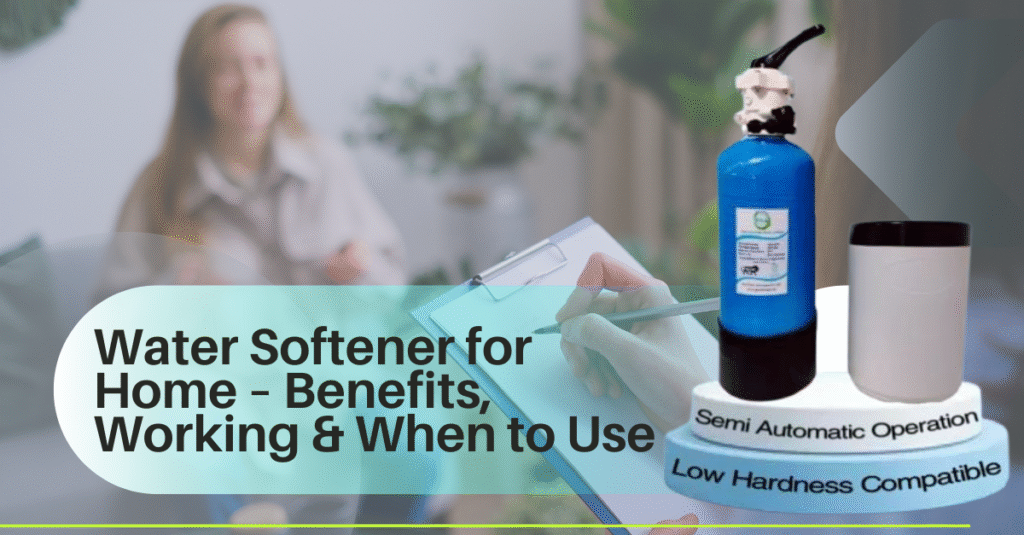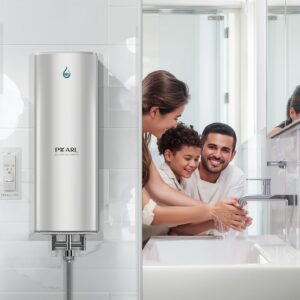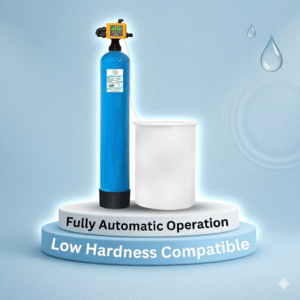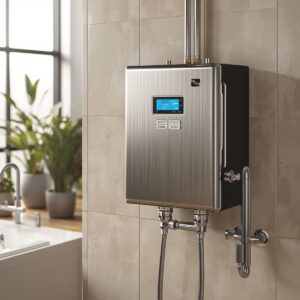Water Softener for Home – Benefits, Working & When to Use
Table of Contents
Introduction
What Is a Water Softener?
How Does a Water Softener Work?
Types of Water Softeners: Electric vs Non-Electric
Key Benefits of Using a Water Softener
Common Applications in Homes
Maintenance Tips
Is a Water Softener Right for You?
Conclusion
FAQs
Introduction
Hard water is one of the most common household water issues in India, especially in homes using borewell or tanker water. It causes white stains, damages appliances, leads to dry skin, and even shortens the life of your plumbing system. The solution? A water softener.
In this blog, we’ll explore how a water softener works, its benefits, the different types available, and how to choose the right model for your home.
What Is a Water Softener?
A water softener is a filtration device designed to remove hardness-causing minerals like calcium and magnesium from water. These minerals, while not harmful to health, create scaling in pipes, water heaters, and appliances, and negatively affect skin and hair.
Water softeners use a process called ion exchange to replace these minerals with sodium or potassium ions, making the water “soft” and gentle on everything it touches.
How Does a Water Softener Work?
The process is simple and highly effective:
Hard Water Inflow: Raw water enters the softener tank.
Ion Exchange: Water passes through resin beads inside the tank. These beads are charged with sodium ions, which exchange places with calcium and magnesium in the water.
Soft Water Output: The softened water exits the tank and flows to taps, showers, and appliances.
Regeneration: After a set amount of water is treated, the resin is flushed with a saltwater solution (brine) to recharge the sodium ions and prepare the unit for the next cycle.
Types of Water Softeners: Electric vs Non-Electric
Feature
Non-Electric Water Softener
Electric Water Softener
Power Requirement
No electricity needed
Requires power for control system
Operation
Manual or automatic (timer-based)
Fully automatic with regeneration cycle
Best Suited For
Small homes with consistent usage
Large homes, villas, or irregular usage
Installation
Easy to install and maintain
Requires skilled installation
Cost
Affordable and low maintenance
Higher initial investment
Key Benefits of Using a Water Softener
Here’s why installing a water softener is a smart move for your home:
✅ Protects Your Plumbing
Prevents scale buildup in pipes, taps, and fixtures, increasing their life.
✅ Saves Your Appliances
Keeps geysers, washing machines, and dishwashers running efficiently without clogging or corrosion.
✅ Better Skin & Hair
Soft water is gentle on your skin and helps reduce dryness, irritation, and frizzy hair.
✅ Cleaner Bathrooms
No more white stains or cloudy deposits on tiles, faucets, or showerheads.
✅ Improves Soap Efficiency
Soaps and detergents lather better and clean more effectively in soft water.
✅ Reduces Maintenance Costs
Less wear and tear on appliances means fewer service calls and longer product life.
Common Applications in Homes
Water softeners are widely used in:
Homes using borewell or tanker water
Apartments and villas with centralized water systems
Families noticing stains on utensils, tiles, or taps
Homes with frequent appliance breakdowns due to scaling
As pre-treatment for RO or UV water purifiers
Whether you live in a city apartment or a countryside bungalow, water softeners are a practical addition to your home water setup.
Maintenance Tips
Maintaining your water softener ensures long-term efficiency:
Refill salt every 15–30 days, depending on water usage
Backwash and regeneration as per schedule or automatically (in electric models)
Use high-quality softener salt for best results
Clean the brine tank periodically to avoid clogging
Check water hardness occasionally with a TDS or hardness test kit
Pearl Water Technologies offers complete AMC (Annual Maintenance Contracts) and service support for hassle-free usage.
Is a Water Softener Right for You?
If you’re dealing with:
White stains on faucets and tiles
Dry, itchy skin after bathing
Hair fall or rough hair texture
Scaling in water heater or washing machine
Less lather while using soap or shampoo
Then yes — a water softener is not just recommended, it’s essential.
Choose based on your water source:
Using borewell or hard tanker water? → Water softener is highly recommended.
On municipal water but still facing stains? → Get your water tested. Moderate hardness may still benefit from a softener.
💡 Pro Tip: Pair your water softener with an RO purifier for complete water treatment (hardness + drinking purity).
Conclusion
A water softener is more than just a filtration system — it’s a smart investment in your home, your appliances, and your family’s comfort. With both electric and non-electric models available, Pearl Water Technologies has a solution for every type of home and water source. Our systems are designed to handle Indian water conditions, are easy to install, and come with expert support. From better skin to cleaner bathrooms and longer-lasting appliances, the benefits are immediate and long-lasting.
👉 Ready to upgrade your water quality? Visit https://pearlwater.in today.
FAQs
Q1. Can I drink water directly from a water softener?
No. Softened water is not meant for direct drinking. It’s best used for bathing, cleaning, and household use. For drinking, use RO purification.
Q2. How often do I need to add salt to the softener?
Typically once every 2–4 weeks, depending on usage and hardness level.
Q3. Is it suitable for borewell water?
Yes, it’s ideal for borewell and tanker water, which often have high calcium and magnesium content.
Q4. Does a water softener require electricity?
Non-electric models do not. Electric models require power for the control valve and regeneration system.
Q5. Can I install the softener myself?
It’s possible for basic models, but professional installation is recommended for optimal performance.
Q6. How long does the resin last?
The resin typically lasts 3–5 years, after which it may need replacement depending on water quality.



